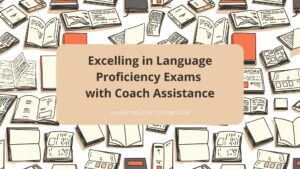Your Language Journey, Your Way: Start with a Private Tutor

Monitoring Language Learning Progress With Your Instructor
As language learners, we all have different goals and motivations for learning a new language. Some may be looking to improve their career prospects or expand their cultural knowledge, while others may want to communicate with friends and family who speak the target language. Whatever your reason for learning a new language, it is essential to monitor your progress to stay motivated and focused on achieving your goals.
One of the most effective ways to monitor your progress as a language learner is by working closely with an instructor. Instructors can provide valuable feedback and guidance that will help you identify areas where you need improvement and develop strategies for overcoming any obstacles you may encounter during the learning process.
In this article, we’ll explore some of the critical benefits of monitoring your language learning progress with an instructor and offer tips for making the most of every lesson.
Table of Contents
Benefits Of Working With An Instructor
Working with an instructor for language learning has numerous benefits.
To begin with, the personalized guidance offered by a qualified instructor can help learners progress faster and more effectively than those without supervision. Instructors are trained to identify individual needs and tailor their teaching style accordingly so students receive customized feedback on areas they need improvement.
Moreover, accountability measures put in place by instructors ensure that learners stay motivated to achieve their goals. When working alone, it’s easy to lose sight of what you’re trying to learn or become distracted by other things around you.
However, when working with an instructor, there is someone who is invested in your success and will hold you accountable for taking necessary steps towards achieving your language learning objectives. This level of accountability helps keep students focused and encourages them to take ownership of their learning journey.
Developing clear language learning goals becomes increasingly essential as we progress, especially if one wants to move steadily in their studies.
Developing Clear Learning Goals
Now that we have explored the benefits of working with an instructor let’s dive into developing clear learning goals. Reflecting on progress and setting milestones are crucial to success in language learning. Your instructor can provide valuable feedback and guidance as you navigate this process.
To begin, it is essential to reflect on your current level of proficiency and identify areas where improvement is needed. This self-reflection will help you set specific, measurable goals that align with your language learning objectives. Additionally, discussing these goals with your instructor can ensure they align with their teaching approach and curriculum. Once these goals are established, breaking them down into smaller milestones can make them more achievable and manageable.
Five Key Takeaways for Setting Clear Learning Goals:
- Self-reflection is critical to identifying areas for growth.
- Discussing goals with your instructor will ensure alignment.
- Specific, measurable objectives should be established.
- Breaking larger goals into smaller milestones increases manageability.
- Regularly monitoring progress towards these milestones helps maintain motivation.
Feedback from your instructor is critical to achieving these learning goals. Through regular assessments and discussions about progress, instructors can offer insight into strengths and weaknesses while providing strategies for improvement. It is essential to actively listen to and use this feedback constructively to adjust study habits or course materials accordingly.
By incorporating reflection and feedback throughout the language-learning journey, students can continuously improve their skills while staying motivated toward reaching their ultimate goal(s). With clearly defined learning objectives and consistent communication with your instructor, language learners can achieve fluency while gaining confidence in their speaking abilities.
Utilizing Feedback For Improvement
Tracking progress in language learning can be challenging, but utilizing feedback from your instructor is an effective way to measure improvement. Think of it like a puzzle – each piece represents a different aspect of your language skills, and the picture becomes more apparent with every piece you add. Consistent communication with your instructor will give you insight into which parts are missing or need improvement.
Communication strategies play a significant role in maximizing feedback for growth. It’s essential to establish clear goals and expectations at the beginning of the learning journey so that both parties understand what success looks like. Additionally, being open to constructive criticism and owning your learning experience can lead to more meaningful feedback. Utilizing these strategies and tracking progress through regular assessments or evaluations provides valuable insights into areas of strength and weakness. By leveraging this information, learners can focus on identifying weaknesses and areas for growth to continue advancing their language skills.
Identifying Weaknesses And Areas For Growth
Tracking progress is an essential aspect of language learning. It enables learners to identify their strengths and weaknesses, determine areas for growth, and improve overall performance. This process can be achieved through regular assessments conducted by the instructor or self-evaluations completed by the learner.
Identifying challenges in language learning can be daunting, especially when one needs to be made aware of where to start. However, it is crucial to understand that everyone has unique learning needs and styles. Thus, a personalized approach will help identify specific areas of difficulty requiring attention.
With this understanding, below are three sub-lists of strategies that can evoke an emotional response from students while identifying weaknesses and areas for growth:
- Emphasize the Importance: Highlighting how addressing these challenges could impact success in future endeavors.
- Provide Support: Offering assistance such as tutoring services or additional resources.
- Celebrate Progress: Acknowledging milestones reached during the journey towards improvement.
These approaches provide learners with practical ways to identify challenges accurately while creating meaningful engagement throughout the learning process.
The following section will discuss various strategies for maximizing learning potential without compromising personal preferences.
Strategies For Maximizing Learning Potential
Imagine two students taking a language course together. Both started with the same level of proficiency, yet one progressed at an exponential rate while the other lagged despite attending every class and doing all homework assignments. What could have made such a difference? The answer lies in personal accountability and time management.
Students must take responsibility for their progress to maximize their learning potential in any language course. They should set clear goals and create action plans to achieve them. This involves tracking their performance, identifying areas they need to improve, and seeking help when necessary. Additionally, effective time management plays a critical role in achieving success in language learning. By prioritizing study time over leisure activities and minimizing distractions, learners can optimize their schedule to enhance productivity and focus on attaining fluency faster.
| Personal Accountability | Time Management |
|---|---|
| Setting goals | Prioritizing study time |
| Tracking progress | Minimizing distractions |
| Identifying areas for improvement | Optimizing schedule |
By adopting these strategies, language learners can make significant strides toward mastering new skills efficiently and effectively. Instead of just going through the motions of attending class or completing assignments without much thought or effort, students who are proactive about their learning will see tangible results sooner than later. Ultimately, it’s up to each learner to decide how far they want to go with acquiring a second (or third) language – but by implementing intelligent techniques like personal accountability and time management into their studies, anyone can reach their full potential!
Frequently Asked Questions
What Is The Best Way To Communicate With My Language Instructor Outside Of Class Time?
Effective communication and building rapport with your language instructor are crucial for success in language learning. It’s essential to establish a clear line of communication outside of class time, but what is the best way to do so?
As an education research analyst, utilizing various forms of technology such as email, messaging apps, or video conferencing can be very effective. However, it’s not just about the medium used to communicate; how you use it counts.
Respect your instructor’s time and availability, and ask specific questions or provide updates on your progress. Doing so will build a strong relationship with your instructor and create an environment where open communication and collaboration are encouraged.
How Often Should I Expect To Receive Progress Reports From My Instructor?
Receiving progress reports from your language instructor is like a refreshing breeze on a hot summer day; it helps you gauge how far you’ve come and what steps to take next.
Frequency expectations for these reports can vary but typically occur every few weeks or monthly.
It’s important to note that personalized feedback should always be included in these updates, as it allows for targeted improvements and highlights areas of strength.
As an education research analyst, I recommend setting clear expectations with your instructor regarding progress reporting frequency and content at the beginning of the course.
This will ensure that both parties are on the same page and maximize learning outcomes.
How Can I Ensure My Learning Goals Align With My Instructor’s Expectations?
To ensure that your learning goals align with your instructor’s expectations, it is essential to have open communication and establish clear objectives from the beginning.
Start by discussing your aspirations in language learning and understanding what your instructor expects of you.
During regular check-ins, share any concerns or questions about how to meet their expectations while still achieving your goals.
Creating a plan outlining specific milestones and tracking progress together is also helpful.
By taking these steps, you can ensure that you are working towards a common goal and maximizing the value of your time spent with your instructor.
What Resources Or Tools Can My Instructor Recommend To Supplement My Language Learning?
Are you looking for additional resources to supplement your language learning?
Your instructor may recommend various tools and apps that can help enhance your language skills. Language learning apps such as Duolingo, Rosetta Stone, and Babbel are great options for practicing vocabulary, grammar, and conversation skills.
Online language communities like Italki or Tandem can also provide opportunities to practice speaking with native speakers.
As an education research analyst, I recommend taking advantage of these resources recommended by your instructor to supplement your language learning journey.
How Can I Approach My Instructor If I Am Struggling With A Particular Aspect Of The Language?
If you need help with a particular aspect of the language, it is crucial to approach your instructor and ask specific questions.
Seeking feedback from your instructor can help pinpoint areas where you need improvement and guide your learning progress.
When approaching your instructor, be open and honest about what you are struggling with and ask for their guidance in finding resources or strategies to help you overcome these challenges.
By actively seeking support from your instructor, you can make more significant strides in your language-learning journey.
Conclusion
Well, well, well. Looks like we’ve got a curious language learner on our hands! And rightfully so – learning a new language can be an exciting and fulfilling journey. But let’s not forget one crucial aspect of this expedition: monitoring progress with your instructor.
First things first, communication is vital. Don’t be afraid to email your instructor or schedule a quick chat outside class time. They’re there to help you succeed, after all.
As for progress reports, it depends on the individual instructor and their teaching style. Some may provide regular updates, while others prefer to wait until certain milestones are reached.
But what about making sure your goals align with your instructor’s expectations? Fear not, my fellow language enthusiast. A simple conversation should do the trick. Ask questions and express any concerns you may have – it’s better to clear the air sooner rather than later.
Now onto resources and tools. Your instructor likely has a wealth of knowledge regarding supplementary materials such as textbooks, apps, or podcasts. So don’t hesitate to ask for suggestions!
And finally, if you struggle in a particular area of the language, reach out to your instructor ASAP (yes, even if it means admitting defeat). They’ll be able to guide you toward additional practice exercises or offer personalized tips to get you back on track.
In conclusion (drumroll, please), staying connected with your language instructor throughout your learning journey is crucial for success. So keep those lines of communication open, and don’t be shy about asking for assistance when needed – trust me, they want nothing more than to see you thrive!



